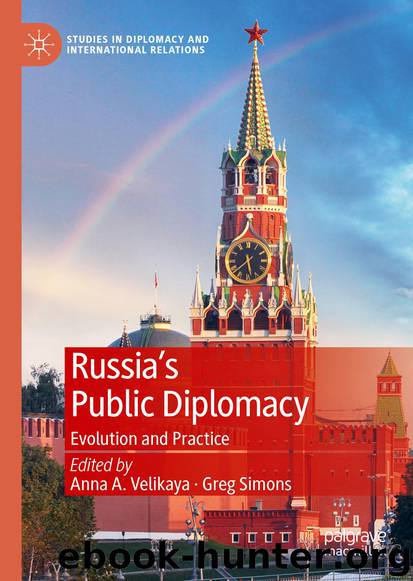Russia’s Public Diplomacy by Unknown

Author:Unknown
Language: eng
Format: epub
ISBN: 9783030128746
Publisher: Springer International Publishing
Mechanisms and Instruments of Emerging Russian Science Diplomacy
Unlike, for example, in the United States, United Kingdom, Switzerland or France, in Russia, science diplomacy as a distinctive research field is still emerging. It is also not fully formed as a relatively independent foreign policy area. But the preconditions for science diplomacy are nevertheless present. In 2010, the president of Russia approved a policy document on the main directions of international cultural and humanitarian cooperation. The document envisages such cooperation both in bilateral and in multilateral formats, including in science and education. Contacts in these areas are becoming increasingly important in the context of the country’s modernization.11 The publication was an addendum to the Concept of Russian Foreign Policy. The new Foreign Policy Concept approved in 2016 also mentions science and research in different contexts. It speaks of the need to deliver unbiased information about the country to the international community and highlight Russian cultural and science achievements. The concept also entails responding to many global challenges, including economic development, global disparities, environmental issues and terrorism, using research-based approaches.12
In 2016, a presidential executive order introduced a new long-term Scientific and Technological Development Strategy of the Russian Federation. According to the document, science is an instrument required to respond to several ‘grand challenges’. These challenges create substantial risks for society, economy and governance but at the same time provide new opportunities and prospects for the country’s scientific and technological development.13 The publication of this strategy can be regarded as the result of the country’s political class becoming aware of a new international political reality. It can also be seen as a demonstration of Russia’s commitment to respond to the ongoing competition for global leadership. Approaches to training academic personnel are being revisited. Attitudes to science, its role in global affairs and its place in politics and diplomacy are changing.
The 2016 Strategy puts science and technology at the heart of responding to many global and national issues. The role of science is to forecast global changes, to consider new trends, expectations and needs of the Russian society, to detect new ‘grand challenges’ in good time and to provide an effective response. One of the priorities is to create a model for international scientific and technological development, as well as for international integration, that could allow mutually beneficial interaction while at the same time protect the identity of the Russian scientific sphere and Russia’s national interests. This is particularly relevant in the era of globalization and internationalization of science.
There are a number of publicly funded governmental and non-governmental organizations involved in Russian science diplomacy. The most prominent of them are the Ministry of Foreign Affairs (MFA), the Ministry of Science and Higher Education, the Ministry of Economic Development, the Ministry of Health, the Ministry of Industry and Trade, the Federal Agency for the Commonwealth of Independent States Affairs, Compatriots Living Abroad and International Humanitarian Cooperation (Rossotrudnichestvo), the Russian Academy of Sciences, the Russian Foundation for Basic Research (RFBR) and the Analytical Centre for the Government of the Russian Federation.
Download
This site does not store any files on its server. We only index and link to content provided by other sites. Please contact the content providers to delete copyright contents if any and email us, we'll remove relevant links or contents immediately.
Fanny Burney by Claire Harman(26602)
Empire of the Sikhs by Patwant Singh(23084)
Out of India by Michael Foss(16853)
Leonardo da Vinci by Walter Isaacson(13336)
Small Great Things by Jodi Picoult(7140)
The Six Wives Of Henry VIII (WOMEN IN HISTORY) by Fraser Antonia(5515)
The Wind in My Hair by Masih Alinejad(5095)
A Higher Loyalty: Truth, Lies, and Leadership by James Comey(4962)
The Crown by Robert Lacey(4814)
The Lonely City by Olivia Laing(4801)
Millionaire: The Philanderer, Gambler, and Duelist Who Invented Modern Finance by Janet Gleeson(4478)
The Iron Duke by The Iron Duke(4354)
Papillon (English) by Henri Charrière(4274)
Sticky Fingers by Joe Hagan(4198)
Joan of Arc by Mary Gordon(4109)
Alive: The Story of the Andes Survivors by Piers Paul Read(4031)
Stalin by Stephen Kotkin(3965)
Aleister Crowley: The Biography by Tobias Churton(3640)
Ants Among Elephants by Sujatha Gidla(3467)
